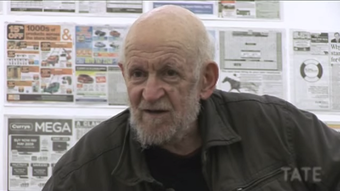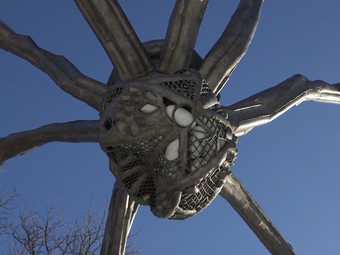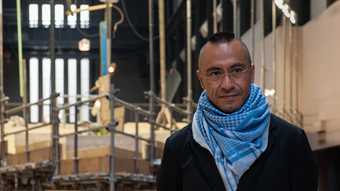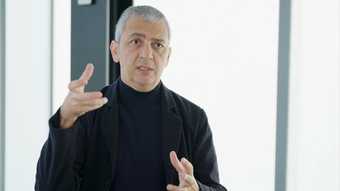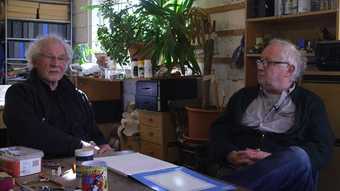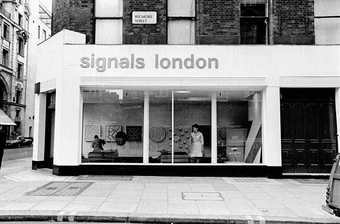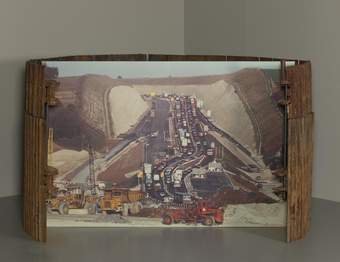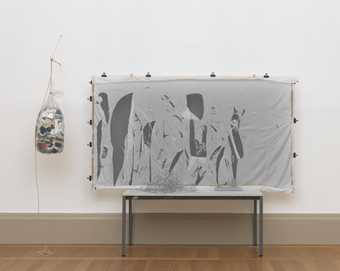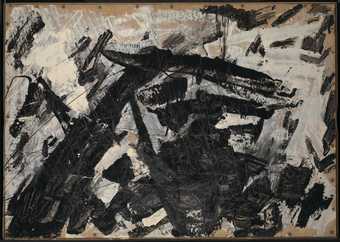Metzger: Every step in nature is a moment of grace.
Wilson: We’re showing paintings that…most of them have never been seen before. It allows us, for the first time, to gain a proper understanding of Gustav Metzger as an artist creating auto-destructive arts, but creating it as an artist, as an activist and an artist who is a painter.
Metzger: I’m full of memories. These memories, of course, include Germany. As a Jewish child growing up in an Orthodox environment your life is saturated with religion and with obligations. When I was twelve years old, when things were hotting up related to Jews… All of that is a constant inner world that I live in.
What I found interesting just now, is that they are now somehow in the region of William Blake. There’s a German word, 'Empor'. 'Empor' which means to expand upwards. 'Empor…zum Himmel', you go up, and of course that’s what Blake is all about.
Wilson: Was he always important for you?
Metzger: I think so. Very, very important as a young person, or anytime.
Wilson: You know, in some of them it also reflects the cloud of the atom bomb as well, so it’s…
Metzger: Well, that’s right. And, of course, everything I have said has left out of account the atom bomb.
Wilson: Before he was a painter he’d always aimed at being a sculptor. He turned to painting and he used various techniques and came across the idea of painting with acid. There is something that as soon as you make a mark, what you make the mark on starts to disintegrate and it starts to eat into the fabric. Brings in an element of time, and it brings in the sense of the ephemeral, it brings in the sense of thinking about art not in terms of space, not in terms of objects but in terms of an event.
Metzger: The planet is in a horrific, horrendous condition. If you include all the weaponry and then add on the pollution and the risk to natural existence, it’s pretty horrendous.
Wilson: Auto destructive art is primarily a form of public art for industrial societies. Auto destructive art didn’t exist until he named it through the manifesto, and that manifesto was distributed and so the idea of auto destructive art was in the public realm. It’s not a private art, it’s not an art for the dilettante, it’s not an art to be collected, it’s an art of statement.
Metzger: The necessity to alert the public, to alert vast numbers of people to the dangers is, I think, the top priority.
Wilson: Metzger isn’t being an iconoclast, he’s not being an aeolist, this is something for society. It’s against those things that are against society. It’s not destroying things, it’s looking at the action of destruction, and part of that action of destruction is to create new forms.
Metzger: All I can say is this totality of life, whatever that might mean, this attempt to grasp what is important, this attempt to merge with what is most important. That is, I think, is the centre of my life.
Wilson: 'I came to this country from Germany when twelve years old. My parents being Polish Jews, and I am grateful to the government for bringing me over. My parents disappeared in 1943 and I would have shared their fate, but the situation now is far more barbarous than Buchenwald for there can be absolute obliteration at any moment.'
Metzger: Wings, can you see the wings flapping here? And it’s all going upwards. They are all going up.

